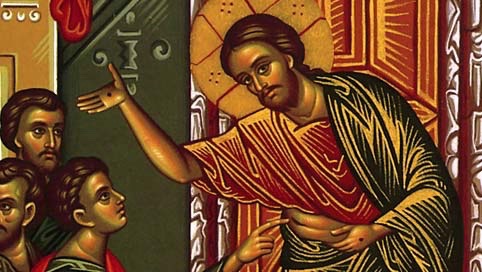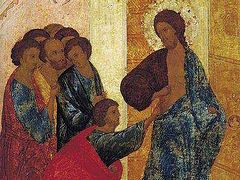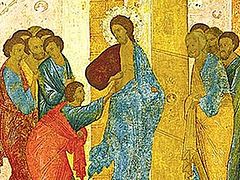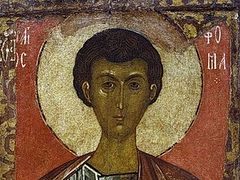Source: Orthodox Christian Network
May 8, 2016

On the evening of that day, the first day of the week, the doors being shut where the disciples were, for fear of the Jews, Jesus came and stood among them and said to them, “Peace be with you.” When He had said this, He showed them His hands and His side. Then the disciples were glad when they saw the Lord. John 20:19-20 Thomas Sunday
Christ is Risen!
The Sunday after Pascha is affectionately known as “Thomas Sunday.” On Pascha, at the Agape Vespers, we read from John 20:19-25, Christ’s first encounter with the Disciples. And on Thomas Sunday, we read John 20:19-31, which includes both the encounter on the evening of Pascha and the second encounter eight days later, when Thomas was present.
On the evening after the Resurrection, which took place on the first day of the week, the Disciples had gathered behind doors that were locked for fear of the Jews. Jesus came and stood among them. He miraculously appeared in their sight. He didn’t knock on the door or announce that He was coming. He just “appeared”.
He spoke with them, to show that not only was He God, but that He was still human. He had experienced a human death and now He had been resurrected from the dead and was appearing to them not as a ghost, not in a dream, but as a human being. His first words to them are “Peace be with you.” Among His last words before His Passion concerned peace as well: Peace I leave with you; my peace I give to you (John 14:27). It is interesting to note that when Orthodox Christians assemble to celebrate the Divine Liturgy, the first three petitions center around peace. And the introductory petition invites us “In peace let us pray to the Lord.” This reflects the first words of Christ to His disciples after the Resurrection, “Peace be with you.”
Sensing that His Disciples will want some kind of proof that He is actually the same Jesus they saw crucified, He shows them the mark of the nails in His hands, and the mark of the spear that pierced His side. This erases all doubt in their minds that this is the same man whom they saw crucified two days earlier.
The reaction of the Disciples becomes one of joy, not of skepticism. Of course, that is easy for them, for they stand face to face with Christ. We have not stood face to face with Christ yet. Or have we?
Every time we celebrate the Divine Liturgy and receive Communion, we have the opportunity to touch the Living God. We taste and see (Psalm 34:8) the Lord in the Eucharist. And after all have partaken, we sing a hymn: “We have seen the true Light; we have received the heavenly Spirit; we have found the true faith, worshipping the undivided Trinity, for the Trinity has saved us.” Does this make us glad? Does this encounter send us away with joy? Or are we skeptical? Or has it even become part of a “routine”?
In the parable of the sower, Jesus says to His disciples, To you it has been given to know the secrets of the Kingdom of God; but for others they are in parables, so that seeing they may not see, and hearing they may not understand (Luke 8:10). This means that some “see” the Lord and yet they don’t see Him. Others are looking and they “see” the Lord, and they see Him with the joy that the Disciples saw Christ that evening in Jerusalem.
How, then, do we see Christ? We see Him through the eyes of faith, which are sharpened through the eyes of vulnerability. Make yourself in some way vulnerable to the Lord, whether it is in the spiritual intimacy of prayer, or the difficult task of forgiveness, the humility needed in the sacrament of confession, or in the selfless act of service to others. Make yourself vulnerable to the Lord and you will “see” Him and have the joy that the Disciples had when they saw the Lord.
Of course, as the saying goes, you will only find what you are looking for. If you are not looking for God, you are not likely to find Him. Which goes back to the question posed many reflections ago: “are you a seeker?” We need to be looking for Christ, and we need to look for Him through vulnerability. And when we find Him, let us pray for our reaction to be one of joy.
As You came and stood among Your disciples, O Savior, and gave them peace, come and be with us also and save us (Hypakoe from Orthros of Thomas Sunday).
May today, His day, be filled with joy, and may you be glad in the time you spend with Him in worship today!



